
Leave message
Can’t find what you’re looking for?
Fill out this form to inquire about our custom protein services!
Inquire about our Custom Services >>


































 Request a FREE Sample of our FcRn Binding Kit!
Request a FREE Sample of our FcRn Binding Kit! Request a FREE Sample of our Fc gamma RI / CD64 Binding Kit !
Request a FREE Sample of our Fc gamma RI / CD64 Binding Kit !
 Happy Holiday! Limited Keychain here with your next order
Happy Holiday! Limited Keychain here with your next order Happy Holiday! Limited Keychain here with your next order
Happy Holiday! Limited Keychain here with your next order
 Request a FREE sample of our GMP products!
Request a FREE sample of our GMP products!  Request a FREE sample of our GMP products!
Request a FREE sample of our GMP products!
> Intestinal-related Solutions & Services Explore our ready-to-use intestinal organoids, cells, kits, and services. We specialize in providing ready-to-use intestinal organoids and differentiation kits, disease modeling and drug testing services. Intestinal organoids are miniaturized versions of the Intestinal that can be grown in the laboratory and used to study various aspects of intestinal biology and disease.
Intestinal organoids can be a good choice to study the differentiation process of intestinal stem cells, as well as the mechanisms of intestinal tissue regeneration and repair. In addition, they can simulate the absorption, distribution and metabolism of drugs in the Intestinal, helping evaluate the impact of drugs on the Intestinal and the therapeutic effect.
Intestinal Organoids
Intestinal organoids are miniaturized versions of the Intestinal that can be grown in the laboratory and used to study various aspects of intestinal biology and disease. The successful development of an inflammatory bowel disease (IBD) model based on intestinal organoid culture could help researchers better understand the immune response of the intestinal system in IBD and other intestinal diseases.
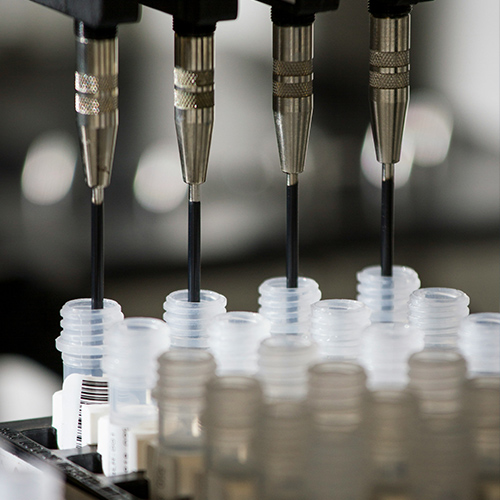
Drug Screening
Drug Screening
Equipped with the ability to mimic the complex environment and physiological functions of the human Intestinal, intestinal organoids provide a more accurate prediction of drug behavior in the human body.
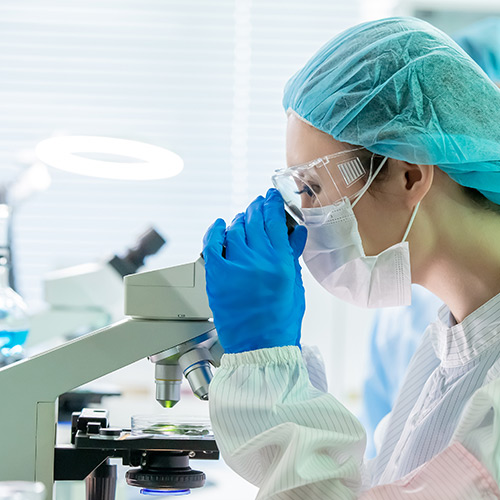
Intestinal Disease Modeling
Intestinal Disease Modeling
Intestinal organoids replicate the real intestinal environment, enabling them to mimic the onset and progression of intestinal diseases more accurately.
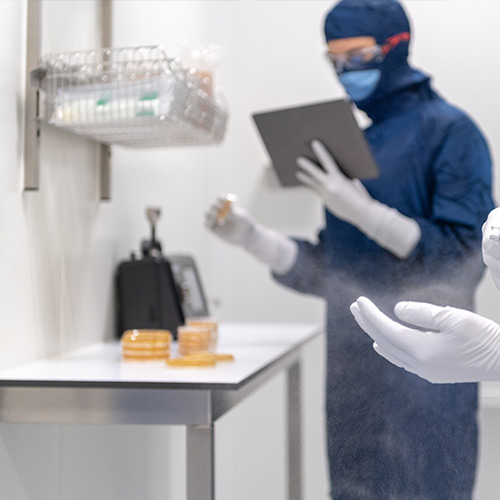
Intestinal Adsorption Studies
Intestinal Adsorption Studies
Intestinal organoids encompass all types of intestinal epithelial cells and possess physiological functions such as water, ion absorption, and transport. Functions such as intestinal absorption process of nutrients, as well as the transport and metabolism of drugs and bioactive substances can be evaluated.
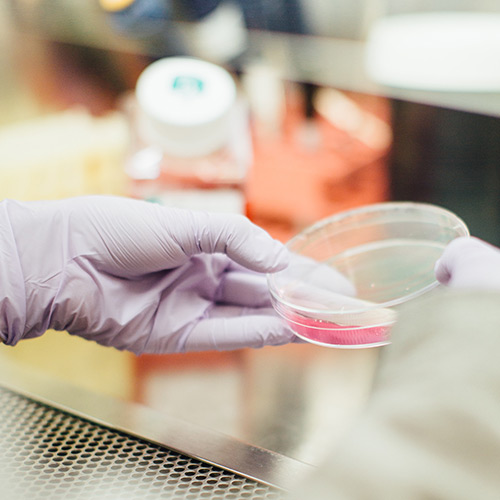
Intestinal Development Research
Intestinal Development Research
The developmental process of the Intestinal is mimicked through organoids, enabling observation and research on how intestinal cells grow, differentiate, and form complex tissue structures.
Intestinal organoids and differentiation kits are available to support high-throughput differentiation of intestinal organoids from iPSCs.
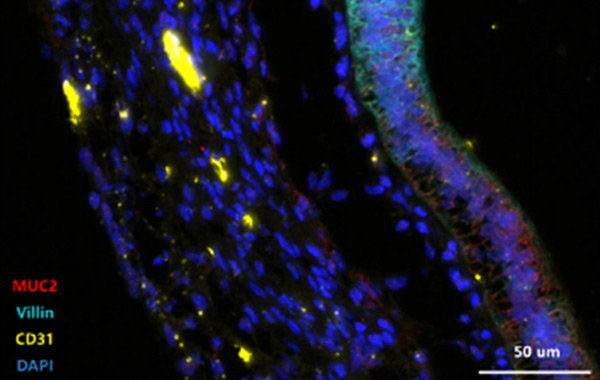
Immunostaining of intestinal organoid shows the marker expression of goblet cells (mucus-producing, MUC2), brush borders (Villin), enterochromaffin cells (CHGA) and endothelial cells (CD31.)
| Cat. No. | Description |
| CIPO-IWL003K | Ready-to-use Human iPSC-Derived Intestinal Organoids |
| RIPO-IWM005K | Human iPSC-Derived Intestinal Organoid Differentiation Kit |
| RIPO-IWM006 | Human iPSC-Derived Intestinal Organoid Maintenance Kit |
Intestinal Cells
Interested? Leave a message!
Intestinal Services
We offer differentiation services to develop Intestinal organoids from iPSCs or human tissue. Organoids are validated by the expression of Intestinal-related protein markers to ensure differentiation and maturity.
We can help measure the ability of intestinal epithelium to absorb nutrients as well as study inflammatory responses and drug-induced enterotoxicity.
We can help to construct the IBD model and provide corresponding pathological and biochemical evidence. At the same time, we can also provide you with follow-up IBD related drug screening services.
Intestinal Case Studies
Developed using our organoid differentiation kit, intestinal organoids derived from iPSCs were exposed to lipopolysaccharides to induce an immune reaction.
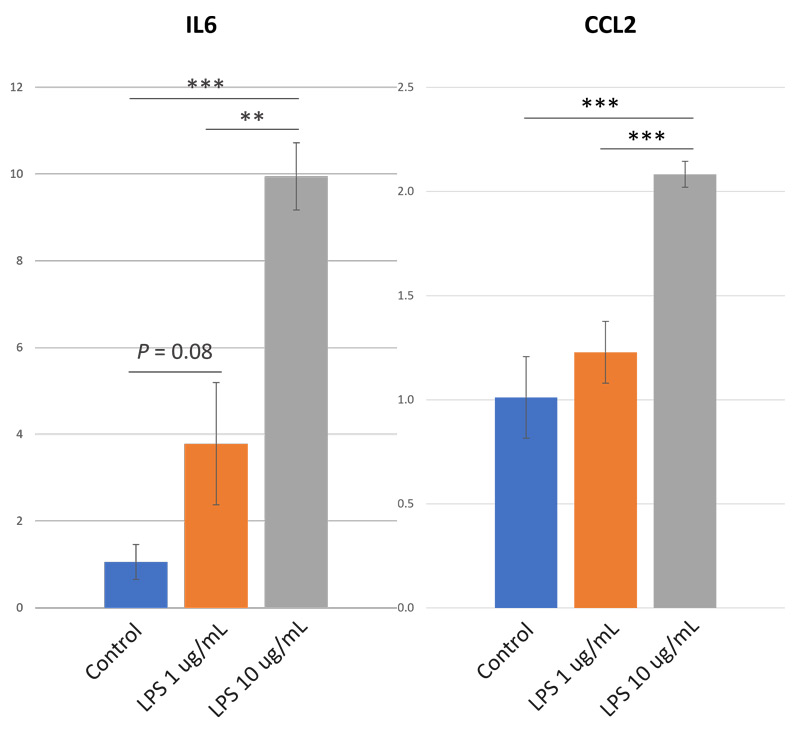
References
1. Li, Vivian SW. "Modelling intestinal inflammation and infection using ‘mini-gut’organoids." Nature reviews Gastroenterology & hepatology 18.2 (2021): 89-90.
2. HOFFMANN P, SCHNEPEL N, LANGEHEINE M, et al. Intestinal organoid-based 2D monolayers mimic physiological and pathophysiological properties of the pig Intestinal[J]. PLoS One, 2021, 16(8): e0256143.
This web search service is supported by Google Inc.













